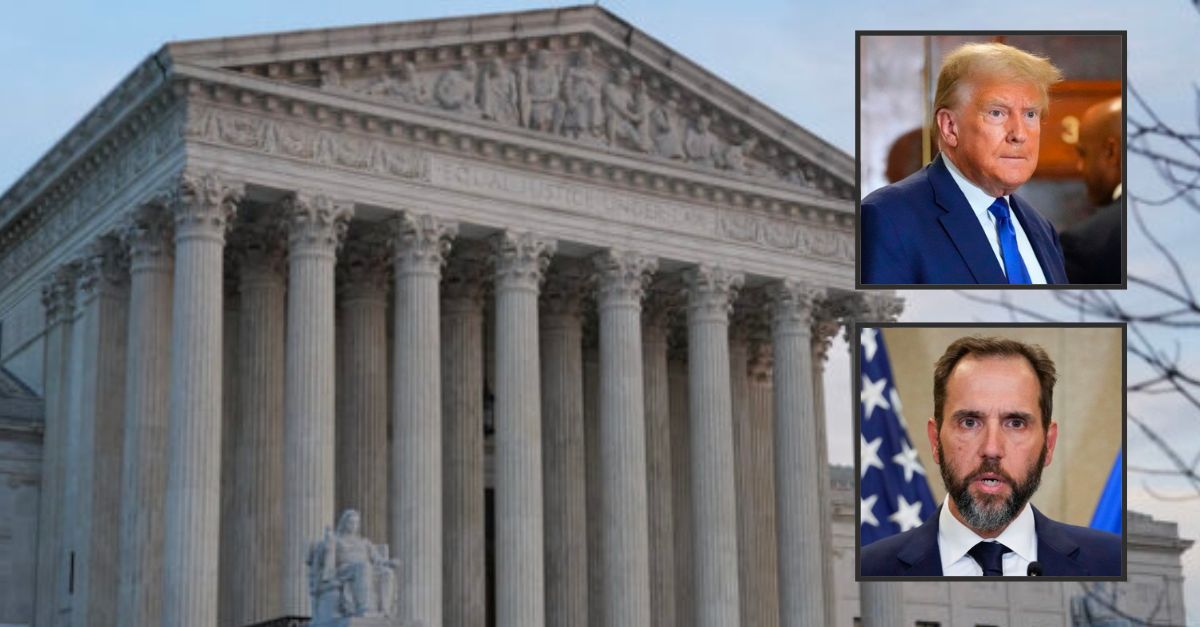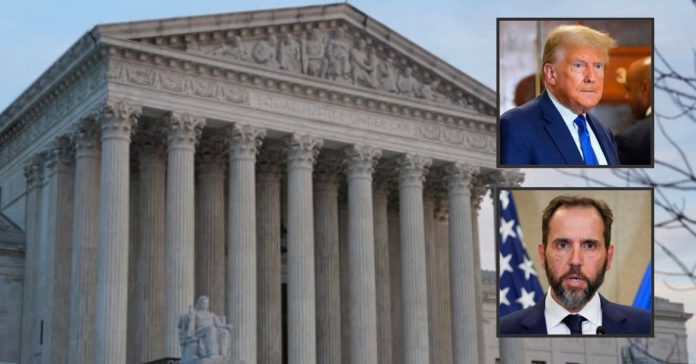
FILE – The Supreme Court building is seen on Capitol Hill in Washington on Jan. 10, 2023. (AP Photo/Patrick Semansky, File) Inset top: Former President Donald Trump speaks during a break in his civil business fraud trial at New York Supreme Court, Wednesday, Oct. 25, 2023, in New York. (AP Photo: Seth Wenig). Inset bottom: Special counsel Jack Smith speaks to the media about an indictment of former President Donald Trump, Tuesday, Aug. 1, 2023, at an office of the Department of Justice in Washington. (AP Photo: J. Scott Applewhite.)
The U.S. Supreme Court will not hear arguments on Donald Trump’s “absolute immunity” defense in his Washington, D.C., election subversion case before the federal court of appeals has had a chance to consider the issue.
Special prosecutor Jack Smith had asked the justices to consider the matter, figuring that whatever happens before the U.S. Circuit Court of Appeals for the District of Columbia — where the question is currently awaiting adjudication — the case would land before the Supreme Court regardless.
The court’s terse, single-sentence order issued Friday was unambiguous.
“The petition for a writ of certiorari before judgment is denied,” it said.
Trump is accused of trying to subvert and overturn the results of the 2020 presidential election — efforts that, according to special prosecutor Jack Smith, culminated in the Jan. 6, 2021, siege at the Capitol. On that day, thousands of Trump supporters violently breached the U.S. Capitol building as Congress had begun to certify Joe Biden’s win in the 2020 presidential election. Trump has argued that “absolute immunity” afforded him in his official duties as president precludes him from facing criminal charges.
As Law&Crime previously reported, Smith tried to speed things along by asking the high court for a writ of certiorari before judgment from the U.S. Circuit Court of Appeals for the District of Columbia.
Although Smith acknowledged that his Dec. 11 petition for a writ of certiorari included an “extraordinary request,” the Trump prosecution itself “is an extraordinary case” akin to the question facing the Supreme Court in the 1974 case of United States v. Nixon, in which the justices granted certiorari before judgment and decided that “[n]either the doctrine of separation of powers nor the generalized need for confidentiality of high-level communications, without more, can sustain an absolute, unqualified Presidential privilege of immunity from judicial process under all circumstances.”
That ruling in favor of special prosecutor Leon Jaworski’s quest for the Oval Office recordings ultimately led to President Richard Nixon’s resignation. Smith had argued that there were similarities between the Watergate-era case and the current Jan. 6 case against the former president.
Trump’s lawyers, in response, urged the justices to exercise restraint and allow the matter to proceed through the usual courts.
Smith’s “insistence on speedy resolution,” Trump’s lawyers argued in a Dec. 20 response to Smith’s petition, led to a ruling at the trial level that was “a hasty analysis of complex issues that overlooks binding authority and commits manifold errors — thus illustrating the hazards of rushed consideration of these questions.”
In a reply brief on Thursday, Smith insisted that the matter is urgent enough to warrant Supreme Court review.
“The charges here are of the utmost gravity,” Smith wrote. “This case involves — for the first time in our nation’s history — criminal charges against a former president based on his actions while in office.”
U.S. District Judge Tanya Chutkan, who is overseeing the trial, ruled on Dec. 1 that the former president’s immunity and double jeopardy arguments were not enough to warrant dismissal of the case.
Law&Crime’s Matt Naham and Brandi Buchman contributed to this report.
Have a tip we should know? [email protected]

